Intel X25-M G2: Dissected and Performance Preview
by Anand Lal Shimpi on July 22, 2009 6:00 PM EST- Posted in
- Storage
The Performance
There are four basic pillars to SSD performance that I like to look at: random read, random write, sequential read and sequential write speed. A good SSD must be strong in all four categories, but some are more noticeable than others. Random read and write speed, particularly of small files (e.g. 4KB) are normally what make our desktop hard drives feel so slow. These random operations are everything from file and table updates to search queries and loading applications; they aren't random over the entire space of the disk but they are random enough to bring conventional hard drives to their knees.
Sequential read/write speed is what you encounter when copying large files. How quickly you can move a Blu-ray image around is determined by these values. I've run all four tests on these drives using IOMeter. I also test all SSDs in a completely used scenario where each LBA/page has been touched, at some point, with valid data. Brand new, out of the box, performance will be greater but not over the life of the drive. If you want to know more about why this is and how I test, I suggest consulting The SSD Anthology.
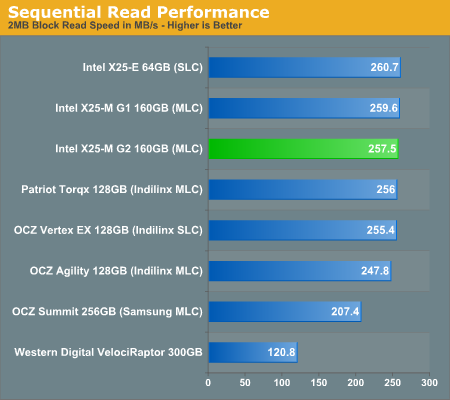
Sequential read performance is basically maxed out for these drives; we're bottlenecked by the SATA bus at this point (300MB/s minus some overhead). We won't see sequential read performance improve until the 6Gbps SATA protocol starts appearing in controllers. The X25-M G2 is basically the same speed as the previous gen here.
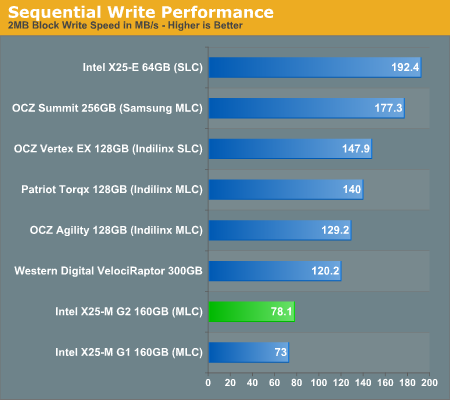
Sequential write performance has always been a bottleneck on the Intel drives. There's a small 7% performance improvement from the new drive, but it's still much slower than any other MLC drive in its class. Pushing higher speeds isn't an issue for the controller as the SLC X25-E actually posts our fastest numbers here.
While I don't believe that 70MB/s write speeds are terrible, Intel does need to think about improving performance here because the competition is already far better. The more important values are still random read/write performance, but sequential write speed is an area that Intel continues to lag behind in.
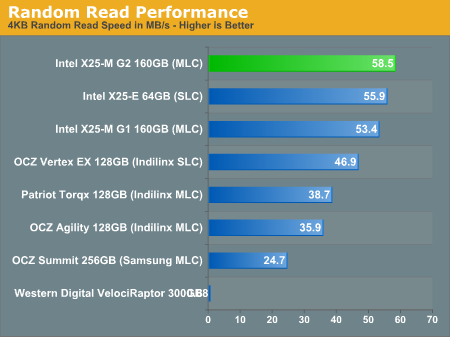
The real strength of the Intel drives is in its random, small file, read/write performance. Here we see a 10% improvement in random read performance over the 1st gen drives, putting the new X25-M ahead of even the X25-E. Now there are obvious lifespan benefits you get from an SLC drive that the G2 can't match, but for a desktop user this thing is even better than the X25-E.
None of the competitors can touch the X25-M here; Intel is 50% faster than the closest MLC contender. It's tough to read but the WD VelociRaptor scores a 0.68MB/s score here.
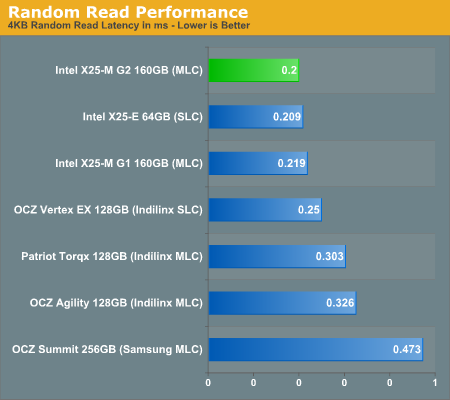
These are the same results as above but I'm reporting average latency instead of average transfer rate. It gives you a bit of the idea of the scale of performance here. I had to remove the WD VelociRaptor because its read latency threw the chart's scale off, it averaged 17.3 ms here.
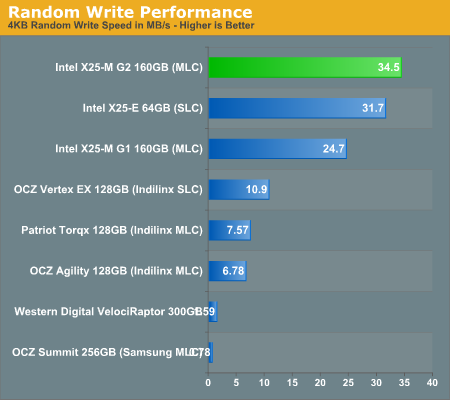
And the X25-M G2's true strength: random write performance. Once again, we're faster than the X25-E and nearly 40% faster than the X25-M G1. None of the Indilinx or Samsung drives can touch Intel here.
The Samsung RBB controller does not seem to like worst-case random writes on a well used drive, it's actually slower than the VelociRaptor here. This is what I've seen in my earlier investigations as well. It actually helps explain why the older Samsung based SSDs in Apple notebooks never really felt all that fast.
Final Words...for now
The X25-M G2 appears to be everything Intel said it would be. It's anywhere from 0 - 40% faster than the 1st gen drive in these low level tests. I would expect to see a 0 - 10% improvement in the real world depending on applications, but that's what I'm off to test next.










87 Comments
View All Comments
InternetGeek - Wednesday, July 22, 2009 - link
Price/Capacity wise I'm just one or two steps away from buying my first SSD.tomoyo - Wednesday, July 22, 2009 - link
I'd make a conjecture that intel's very good random write performance may somehow relate to why the sequential write isn't as good, although this isn't evident in the SLC version of their SSD. The other possibility is that Intel is distinguishing between their SLC and MLC series through lower write. I'd have to say that random read and write are way more important for a normal desktop user than anything else though, I always notice latency and responsiveness far more than a small change in long term transfer speed. Personally I'm very interested in getting a 80GB/160GB as a main os drive for both my primary box and a ZFS RAID server/storage box.haze4peace - Wednesday, July 22, 2009 - link
With the recent price drops I'm considering getting this drive in its 80GB flavor as an OS drive. Sequential write speed is the least of my concerns, because once you load on your OS and other apps, you barely write in big blocks.pennyfan87 - Wednesday, July 22, 2009 - link
I think Anand forgot to include the G.Skill Falcon series along with the other Indilinx MLC drives.Just sayin'.
Anand Lal Shimpi - Wednesday, July 22, 2009 - link
woops, you're right, table updated :)hyc - Friday, July 24, 2009 - link
And isn't the Samsung controller in the OCZ Summit also used in the Corsair P256 and SuperTalent MasterDrive SX?hyc - Friday, July 24, 2009 - link
doh. Corsair P256 is already listed....deputc26 - Wednesday, July 22, 2009 - link
Given the choice which controller would you rather have in your drive? despite samsung's reputation, I'm going with indilinx.Anand Lal Shimpi - Wednesday, July 22, 2009 - link
My pick is still the Intel drive, but I'd take Indilinx over Samsung (assuming there are no compatibility issues with the system I was putting it in).Take care,
Anand
deputc26 - Wednesday, July 22, 2009 - link
I also pick Intel as number one but the battle for second place is a little grayer, Samsung is more expensive which leads many to believe it is faster which of course is not the case.